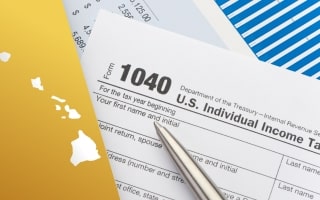Property Tax Records in Hawaii

When you enter the real estate market in search of a home, there are a lot of factors you'll need to consider. For example, buying a home in a neighborhood that's governed by an HOA means that your monthly mortgage payment will be higher. This payment is also affected by your property taxes. Most states in the country levy a property tax and use the collected money to pay for school systems and other public services.
Currently, the property tax rate in Hawaii is among the lowest in the country at 0.43%. However, your annual tax payment can still amount to a couple of thousand dollars because of the high home values in Hawaii. In fact, Hawaii is just behind California in having some of the highest home values in the country. The median home value is around $750,000. This means that Hawaiians end up paying some of the highest property taxes in the country.
In Hawaii, property tax assessments were once combined with other taxes. In 1930, assessments began to be recorded apart from other taxes. While property taxes are currently collected by each county in Hawaii, they were once controlled by the state. It wasn't until 1980 that property tax records in Hawaii transitioned from state control to county control.
Property Tax Assessment in Hawaii

While each of the four counties in Hawaii has different tax rates, they use similar systems to collect property taxes. The taxes you pay are based on your home's assessed value. The assessment department in your county will appraise each home to determine how much they're worth.
If a home has been newly built, the appraiser will personally visit the property. Otherwise, a mass appraisal is held to estimate the values of groups of properties at once. Mass appraisals occur once every year.
After the property's assessed value in Hawaii is calculated, the exemptions you qualify for will be subtracted. Counties determine tax rates based on $1,000 in taxable value. Let's say that the residential tax rate is 3.5. In this scenario, you'll divide 3.5 by $1,000. If the taxable value of your property is $300,000, your tax bill will amount to $1,050.
While the average tax rate in Hawaii is 0.43%, it can vary from county to county. Each county has the power to set its own tax rate without consulting the state. The average property tax rates for the four counties in Hawaii are around:
- Honolulu County: 0.38%
- Hawaii County: 0.90%
- Maui County: 0.56%
- Kauai County: 0.49%
As you can see, property taxes in Hawaii County are the highest by about double.
Calculate Hawaii Taxes
A smart way to understand how property taxes are calculated in the state is to use a Hawaii property tax calculator. This tool helps both homeowners and real estate investors estimate their tax assessment and annual liability by entering key property details like location, classification, and assessed value.
A Hawaii property tax calculator provides a clearer picture of your annual tax obligations and helps identify potential exemptions and tax relief programs, such as the Homeowner Exemption, which reduces the assessed value for owner-occupied properties, and special exemptions for senior citizens, disabled homeowners, and veterans. Each county offers its own exemption amounts and eligibility criteria, making the calculator a useful tool for exploring savings based on your location and situation.
using our property tax calculator.
Hawaii Property Tax Records: What Are They?

When you pay property taxes in Hawaii, the money is used for numerous public services. Unlike most states, however, these taxes don't go directly toward funding school systems.
Instead, the money is used to fund a wide range of county services, such as fire and police departments, parks and recreation, and road maintenance. Your tax payments help improve the quality of the city you live in. Property tax rates can be increased or decreased based on the county's monetary needs.
Property taxes are assessed on every type of real estate. If you want to search property tax records for a home, you're about to buy or a property you're thinking of investing in, you can find the information you seek through county databases.
When you enter the address or owner of a property, you'll receive a comprehensive report that allows you to view everything from the home's market value to its current tax bill. The main pieces of information that you can find in property tax records include the following:
-
Parcel number
-
Location address
-
Area code
-
Legal information
-
Map of the surrounding area
-
Owner names
-
Assessment notices
-
Tax bills
-
Historical tax information
-
Appeal information
-
Improvement details
-
Extensive sales information
-
Permit details
If you want a copy of the entire tax record, you can download one. The "Download" button can be found at the bottom of the report.
Property Tax Exemptions and Deductions in Hawaii

If you buy a home in Hawaii, you may have the opportunity to apply for exemptions and deductions that allow you to effectively reduce your annual property taxes. Hawaii has some of the best exemptions in the country.
Homeowner Exemption: As long as you reside in the home that you own, you may qualify for the homeowner exemption. This exemption was first made available in 1896 to provide homeowners with tax relief.
The exemption amounts to a $120,000 reduction in assessed value for homeowners under 65. If your birth date isn't on file, you can still claim this exemption. If you're at least 65 years old, you may qualify for a home exemption that amounts to $160,000.
Disability Exemption: If you own a home and suffer from a disability, you may qualify for this exemption. Like the standard homeowner exemption, the purpose of this tax break is to lower the assessed value of your property.
Keep in mind that different exemption amounts are available depending on the disability. For example, homeowners who have impaired sight or hearing can qualify for a $50,000 exemption. Disabled veterans who sustained their injuries while on active duty can claim a full exemption from property taxes. If you qualify for the exemption, you don't need to refile your claim every year.
How To Search Property Tax Records in Hawaii

Once you decide to search property tax records, you have several options at your disposal. For example, you can obtain these records by navigating to the tax assessor's website for the county you currently reside in.
These records are available through an online database that the county's Real Property Assessment Division maintains. When you access a county's online database, you can search for a property based on parameters like owner name, location address, and parcel number.
You can also request these records through a third-party service like PropertyChecker. When you use the county's property tax records, the amount of data you receive can be somewhat limited. In comparison, PropertyChecker provides you with tax records as well as many other documents that can help you determine if a home is worth buying.
When using the PropertyChecker tool, you can search for homes with the address of the property, the owner's name, their phone number, or the parcel ID. If you have the owner's email address, it may help you pick up the tax records for the property. The types of property data you'll receive with this search include the following:
-
Purchase history
-
Deeds
-
Loan records
-
Neighborhood info
-
Property Values
-
Building permits
-
Lien records
-
Foreclosures
How To Appeal Property Taxes in Hawaii

If you get your property tax bill in the mail and discover that your taxes have risen by several hundred dollars, you shouldn't automatically accept that this number is accurate. It's possible that your home has been valued higher than it's worth. If you don't understand why your taxes have increased sharply in a short period, consider filing an appeal. Luckily, it's easy to appeal property taxes in Hawaii.
In Hawaii, homeowners can file an appeal in their county if they disagree with the home's assessed or appraised value. For example, Maui County allows homeowners to file appeals with the Real Property Tax Division Board of Review if they believe the property's assessed value is too high.
The deadline for filing this appeal is April 9, which is well after the February 20 due date. Keep in mind that you'll still need to pay your property taxes on time. Even if you have an appeal pending, the county will charge interest on any missed payments. Here's a closer look at the steps that must be taken when filing an appeal:
Step 1: Look out for your property tax bill, which shows the assessment value and the amount you owe. You should receive it in the mail well before March 15. The assessed value of your home is set directly by the Real Property Assessment Division.
Step 2: Once you receive the bill through the mail, determine if the value is too high for you to accept. Keep in mind that your appeal should be filed somewhat shortly after you get your bill. In Maui County, it's due by April 9. You must also pay a $75 fee to the Board of Review when you submit your application.
Step 3: On the hearing date, you'll need to have documentation with you that supports your argument. You'll receive a notice in the mail about the date of your hearing around 15 days before it's scheduled to occur.
Step 4: During the hearing, you'll have five minutes to present your evidence. Some data can't be shown during this hearing. For example, you can't show the assessed values of other properties or the total amount of your tax bill.
Step 5: The only thing the Board of Review can do is change the assessed value of your property, which could lead to your taxes being reduced. They could make their decision at the end of the hearing or send you a notice through the mail after a week or two.
Step 6: If you disagree with the Board of Review's decision, you can appeal to the Tax Appeal Court within 30 days.
How Property Tax Records Impact Real Estate Transactions in Hawaii

Because of the high property values that come with real estate, property taxes aren't always a major factor in real estate transactions. However, the counties with the lowest property tax rates may be more appealing to buyers and investors who are looking for ways to keep their costs down.
For buyers, they might use the local property tax rate to calculate their monthly mortgage payment. If you're selling a home in an area with a low property tax rate, you may be able to do so at a price that's higher than the current market value. Otherwise, you need to be careful not to price your home too high. Buyers may care more about property taxes if they need to pay a high interest rate on their loan.
When you buy a home or multifamily building to add to your investment portfolio, you'll need to calculate property taxes to determine how they will impact your monthly cash flow. If you need to pay hundreds of dollars every month to cover your property taxes, these costs can eat into your profits and overall cash flow.
When you receive your property tax bill, it will come with a due date. In most counties, property tax bills are sent twice per year. You'll need to pay them by February 20 and August 20. If you don't make your tax payments on time, your county will assess interest, which means that the amount due will continue to increase. A lien will also be placed on the property to ensure the county receives what they're owed if the owner attempts to sell their home.
If a homeowner doesn't pay their taxes after a lengthy period, the property can be taken through the foreclosure process. This situation is highly appealing to investors who are looking to purchase homes at a discount, as it's relatively easy to find some great deals. The county you live in will host auctions for homes with delinquent taxes, which means that you have the opportunity to bid for a home and buy it at a reduced price. The winner of the bid will need to pay the delinquent taxes if they want to have the title transferred to them.
In Maui County, homes are sold in public tax sales if taxes have been delinquent for at least three years. When you visit the county's website, you can see a list of public tax sales in Maui County that are scheduled for auction and more information on the parcels.
Free Hawaii Property Tax Lookup
Tax Records Please wait...
Property Tax Guide
- Property Tax Records in Hawaii
- Property Tax Assessment in Hawaii
- Hawaii Property Tax Records: What Are They?
- Property Tax Exemptions and Deductions in Hawaii
- How To Search Property Tax Records in Hawaii
- How To Appeal Property Taxes in Hawaii
- How Property Tax Records Impact Real Estate Transactions in Hawaii
Instant Access to Hawaii Property Records
- Owner(s)
- Deed Records
- Loans & Liens
- Values
- Taxes
- Building Permits
- Purchase History
- Property Details
- And More!
Free Hawaii Property Tax Lookup
Tax Records Please wait...
Property Tax Guide
- Property Tax Records in Hawaii
- Property Tax Assessment in Hawaii
- Hawaii Property Tax Records: What Are They?
- Property Tax Exemptions and Deductions in Hawaii
- How To Search Property Tax Records in Hawaii
- How To Appeal Property Taxes in Hawaii
- How Property Tax Records Impact Real Estate Transactions in Hawaii